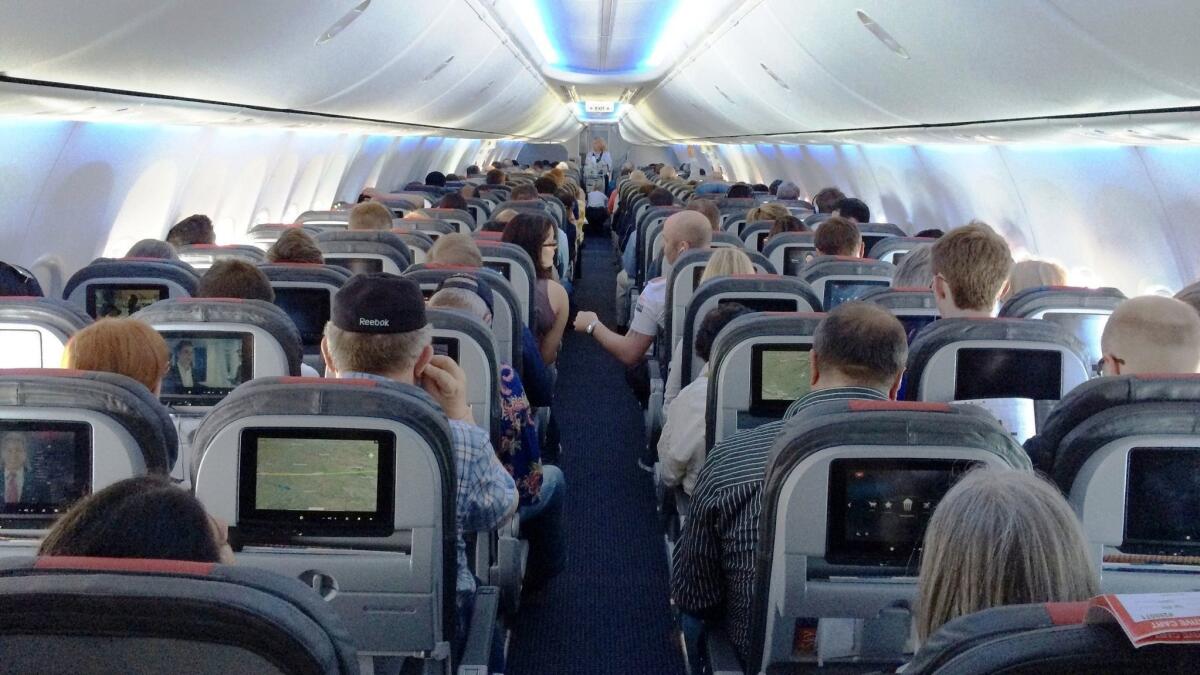Will the FAA rescue passengers from shrinking airline seats?

- Share via
Air travelers who have been complaining about ever-shrinking airline seats may get some relief in a five-year funding bill for the Federal Aviation Administration that President Trump signed into law Friday.
Still, passenger advocates didn’t get everything they wanted from the 540-page bill.
“Overall, it’s definitely a step forward,” said Paul Hudson, president of Flyersrights.org, a passenger rights group with about 60,000 members. “However, much more needs to be done.”
The so-called reauthorization bill includes language that instructs the FAA to draft regulations establishing minimum seat dimensions, including width, length and pitch — commonly referred to as legroom.
The country’s airlines have long opposed government-imposed dimensions, saying regulators should be concerned only that passengers have enough space to exit the cabin quickly in an emergency.
But with airlines reducing legroom space and passenger rights groups demanding relief, lawmakers added language to instruct the FAA to reexamine its standard.
“Safety must never take a backseat, much less a shrunken seat, to profits,” said Rep. Steve Cohen (D-Tenn.), who along with Rep. Adam Kinzinger (R-Ill.) proposed the seat provision included in the bill. “The safety of the public must be the airlines’ primary concern, and this bill now requires the FAA to take it seriously.”
Airlines for America, the trade group that represents the nation’s biggest airlines, said it supports the bill’s language, noting that the FAA has not objected to the seats already installed on all of the airlines — even those that passengers complain are too cramped.
“We support the federal government’s role in determining what seat size is safe as required by this bill,” said Alison McAfee, a spokeswoman for the group.
But Hudson said he worries that the FAA will consider only safety when creating minimum seat dimensions, ignoring the comfort and health of travelers.
“They could simply set the standards at where they are now or even lower,” he said.
The bill also prohibits airlines from involuntarily removing a passenger who has a confirmed reservation and has already checked in — a response to the ugly scene last year when a Kentucky physician was dragged off an overbooked United Airlines flight.
Language in the bill that would have allowed the Department of Transportation to regulate “unreasonable” passenger fees charged by airlines was killed in a conference committee.
“Congress has missed an historic, once-in-a-generation opportunity to stop gargantuan airlines from gouging Americans with exorbitant fees every time they fly,” said Sen. Edward J. Markey (D-Mass.), who drafted the language to regulate airline fees.
Airlines, which lobbied hard against the provision, are probably breathing a sigh of relief.
In 2017, the country’s airlines collected $4.6 billion from baggage fees and $2.9 billion from reservation change fees, which represent the only two ancillary passenger fees the airlines are required to report to the Bureau of Transportation Statistics.
To read more about the travel and tourism industries, follow @hugomartin on Twitter.
More to Read
Inside the business of entertainment
The Wide Shot brings you news, analysis and insights on everything from streaming wars to production — and what it all means for the future.
You may occasionally receive promotional content from the Los Angeles Times.











